CESA
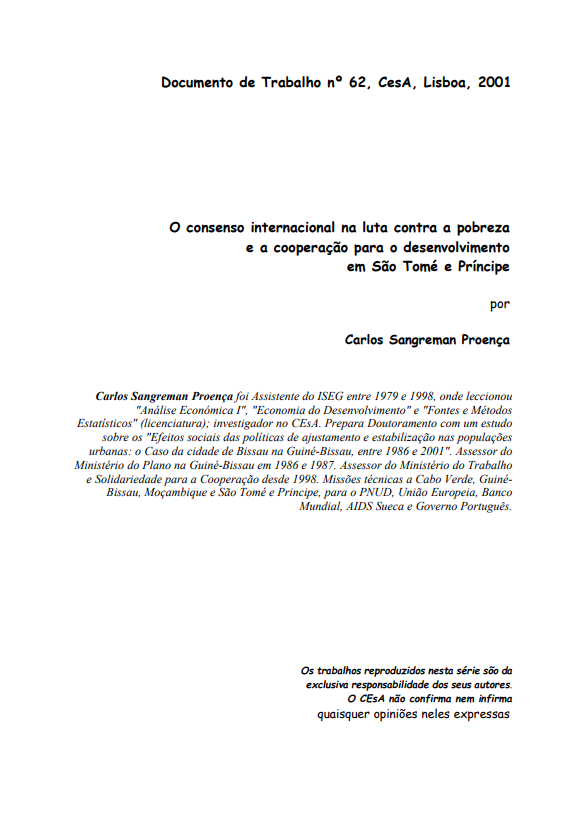
Working Paper 62/2001: O consenso internacional na luta contra a pobreza e a cooperação para o desenvolvimento em S. Tomé e Príncipe
Abstract:
The fight against poverty is the central axis of cooperation. In other words, within each area, the priority actions are those that the international community consensually considers in recent years to be most effective in the fight against poverty, as will be exemplified later. In O consenso internacional na luta contra a pobreza e a cooperação para o desenvolvimento em S. Tomé e Príncipe, as a methodology to determine the content of this consensus, reports from different specialized agencies of the UN (ILO, IFAD, WHO, UNESCO) and the WB/IMF were sought. Thus, we tried to use publications where the international community continues to debate the alternatives of strategies, policies and instruments with which it seeks to solve the problem of the persistence of inequalities in the development of the group of countries in the world. In cross-cutting areas, strengthening governance institutions and civil society is a priority. Thus, this area prevails over the other transversal areas such as gender, environment, statistics. And within this area, cooperation with institutions that have responsibilities in the area of fighting poverty prevails, such as the Ministries of the social area and of work/employment, the municipalities in the areas with the highest poverty index (extent and severity) the organizations of secular and religious civil society working with vulnerable groups (in São Tomé and Príncipe the elderly, landless farmers, female heads of households). In the sectoral areas, priority goes to agriculture, education, health and social protection, as a safety net for the poorest, once again prioritizing actions that directly attack poverty in relation to other actions in the same areas.
Quotation:
Sangreman, Carlos. 2001. “O consenso internacional na luta contra a pobreza e a cooperação para o desenvolvimento em S. Tomé e Príncipe”. Instituto Superior de Economia e Gestão CEsA – Documentos de Trabalho nº 62/ 2001
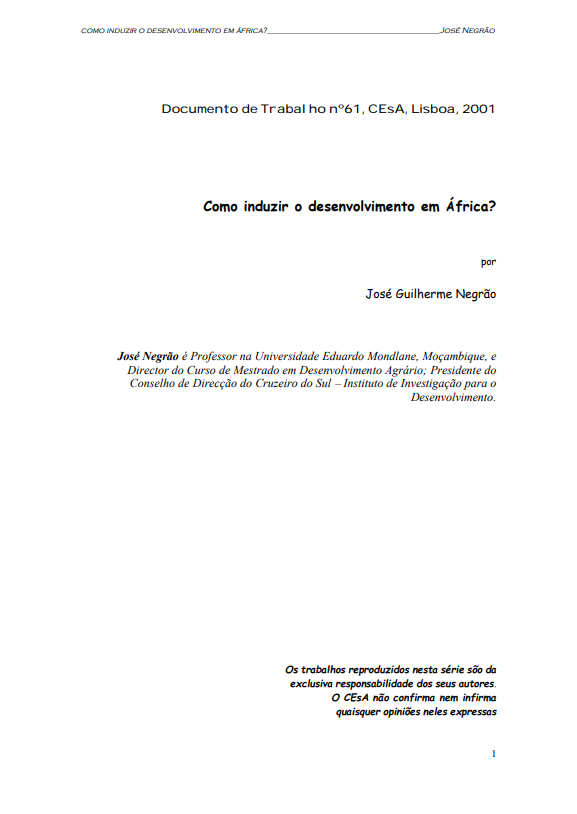
Working Paper 61/2001: Como induzir o desenvolvimento em África?
Abstract:
The research carried out in Como induzir o desenvolvimento em África? allows us to conclude that, in order to obtain the investment, it must be oriented towards: (i) Making cheap money available to the national business sector in order to increase demand from the family sector through agro-industry; (ii) The establishment of new type partnerships between the business and family sectors, the latter having as capital the natural resources of the area it occupies and the former the technology and know-how of management and access to markets; (iii) The development of human capital, in particular through basic education, improving the quality of drinking water and general sanitation conditions; (iv) Reducing distances related to services, markets and resources through the construction of infrastructure and the progressive replacement of wood fuels with electric and fossil fuels; (v) In the reconstitution of the institutional fabric, having as principles the participation at all levels in the decision-making processes, the balance in gender relations and the incorporation of endogenous and transversal institutions in the dynamics of governance.
Quotation:
Negrão, José Guilherme. 2001. “Como induzir o desenvolvimento em África?”. Instituto Superior de Economia e Gestão. CEsA (Centro de Estudos sobre África e Desenvolvimento) – Documentos de Trabalho nº 61/2001.
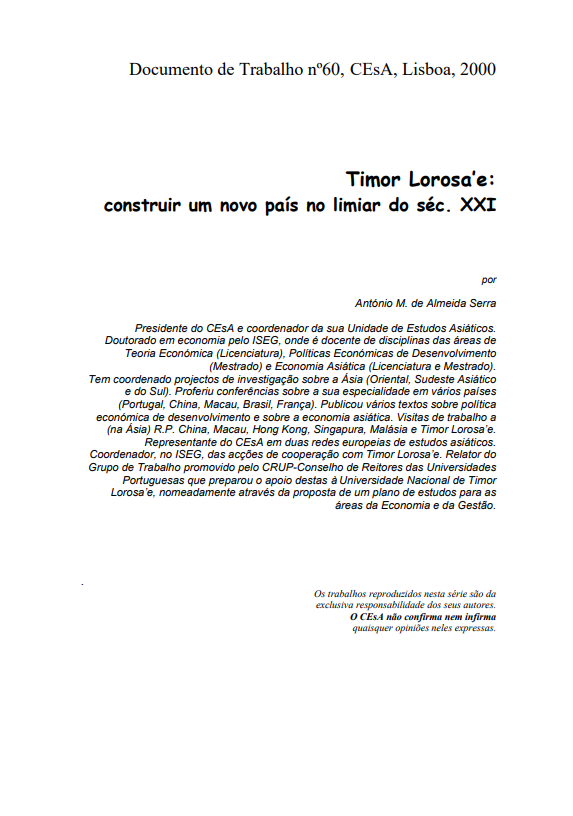
Working Paper 60/2000: Timor Lorosa’e: construir um novo país no limiar do séc. XXI: propostas de estratégia e de políticas económicas de desenvolvimento
Abstract:
Timor Lorosa’e is currently at a crucial stage in its life as a country as the political structure that has represented its people so far is preparing to define some of the guidelines for the future Timor Lorosa’e. Similar to what happened with our previous text, the main objective of this one is to present some proposals for the main lines of development of Timor Lorosa’e in the hope of being able to contribute to the debate on them. Thought to be ready some time before the Congress of the CNRT-National Council of Timorese Resistance, it ended up being written before, during and after this relevant event in the life of the country in formation. Some of the ideas presented were ‘fine-tuned’ during the work of the aforementioned Congress, which we had the opportunity to attend as an observer. It was in this capacity that we were even able to attend and participate punctually in the sessions of its Commission n.º 3, which focused on the central aspects of the economic organization of the future Timor Lorosa’e. We begin by making a small summary of the path taken so far, which simultaneously serves as a diagnosis of the starting situation and which it is necessary to transform as quickly as possible. Thus, the first part summarizes the evolution of Timor from the end of the Indonesian period of administration to the present (i.e., until July/August 2000). At the same time, a diagnosis of the current situation will be made. In the second part, some fundamental principles of current thinking about the economic and social development process that are considered relevant to the development process of Timor Lorosa’e as a fully independent country are discussed. Finally, and based on the elements explained in the previous parts, a set of concrete proposals will be made that, we hope, can be useful in the debate on the future that Timorese leaders and population, each group in its own way, will have to fight until they reach the moment of decision and subsequent implementation of a development strategy (and respective measures). A work of this kind is never, despite all individual efforts, the work of a single person. Some people who I cannot fail to thank contributed indirectly to Timor Lorosa’e: construir um novo país no limiar do séc. XXI: propostas de estratégia e de políticas económicas de desenvolvimento: Fernanda Teixeira, Fernanda Borges, Nadine Grant, Carrascalão da Silva, Helder da Costa, João Mariano Saldanha, Manuela da Costa and others. To all, thank you very much! It goes without saying that if the eventual virtues of the text are due, for the most part, to them, all its faults are mine alone.
Quotation:
Serra, António M. de Almeida. 2000. “Timor Lorosa’e: construir um novo país no limiar do séc. XXI: propostas de estratégia e de políticas económicas de desenvolvimento”. Instituto Superior de Economia e Gestão. CEsA – Documentos de Trabalho nº 60/2000
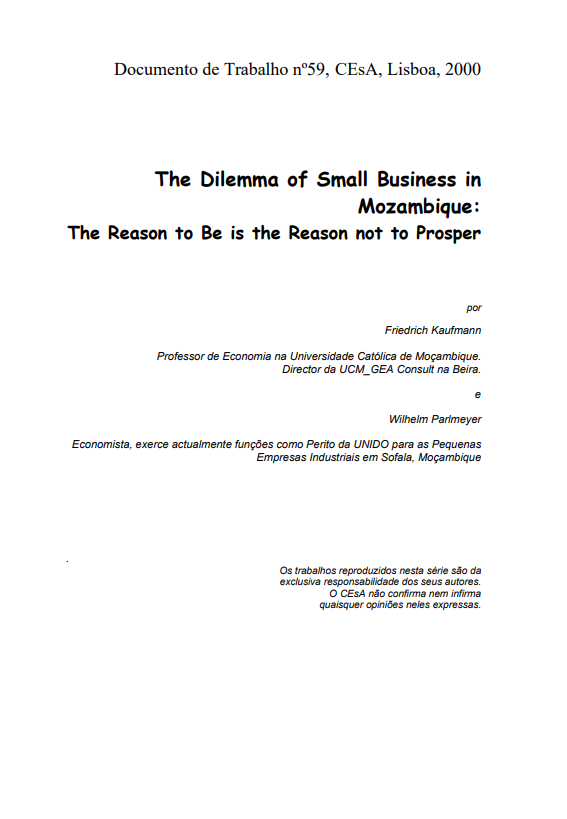
Working Paper 59/2000: The dilemma of a small business in Mozambique: the reason to be is the reason not to prosper
Abstract:
Running a small business in Mozambique, even in the presence of assistance from NGO’s like PAPIR, is a highly risky activity. Many firms from our sample have already closed down and the performance of many small firms has, in the last year, been quite poor. Most of these firms are very labour-intensive and don’t have access to energy or a stable working place. The growing competition is a problem, although there are positive aspects to it from the consumers’ point ofview. One of the main problems of Mozambican small businesses is that they have some characteristics on which, on the one hand, they depend to survive, but which, on the other hand, make it impossible – or at least difficult – for them to prosper and grow. Most small businesses are informal, unregistered, have no bank account and are usually temporary activities. They help to diversify the family income and are organised in local circuits. The first part of this text provides a review of the literature on small businesses in Africa, particularly in Mozambique, namely its characteristics and possible reasons to be. The second part highlights the results of several interviews with small-business entrepreneurs in Sofala/Mozambique.
Quotation:
Kaufmann, Friedrich e Wilhelm Parlmeyer. 2000. “The dilemma of a small business in Mozambique: the reason to be is the reason not to prosper”. Instituto Superior de Economia e Gestão. CEsA – Documentos de Trabalho nº 59/ 2000.
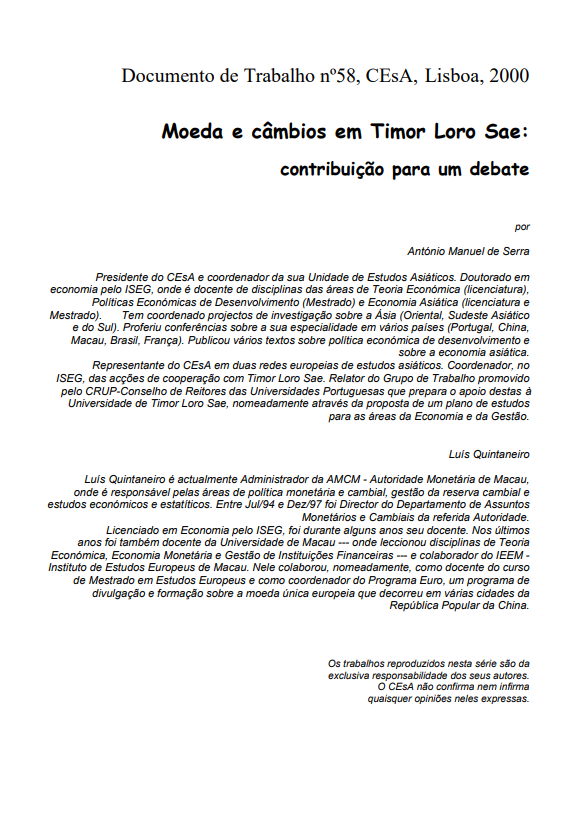
Working Paper 58/2000: Moeda e câmbios em Timor Loro Sae: contribuição para um debate
Abstract:
Timor Loro Sae’s independence poses several specific problems to the country’s economic policy and respective decision-makers. One of the most important and sensitive ones (economically and politically) is that of currency: whether or not to create a new (national) currency and, if so, how to manage its exchange rate with other currencies. Moeda e câmbios em Timor Loro Sae: contribuição para um debate” intends to be a contribution (dispassionate and as technical as possible) to the debate on this topic. Given that the authors had the opportunity to address the matter in the period before the referendum and its consequences for Timor Loro Sae as well as after this fact and the destruction of a significant part of the physical structures of the territory that followed it, it was It is interesting to make a history of thinking about the problem and determine to what extent these latest events condition (or not) the suggested solution. After a short introduction, the text addresses the issue of the creation (or not) of a new currency as it could be considered before the referendum and, in a second part, the subsequent changes to that act of popular consultation. Our conclusion (attempt) is that, if a national currency is to be issued (and we believe that should be the way), it must be managed by establishing a peg to another more credible currency on the market, preferably the Australian dollar. Depending on the relative importance that international aid and oil revenues will have in the economy, one could consider the alternative possibility of the peg being made in relation to the USD, but it does not seem essential that this is the case, and lessons should be learned from the the 1997 Asian crisis on the possible negative effects of being too closely tied to this currency. There is no particular advantage to be seen in a connection to the Euro; to be established, it will always be, for us, a second (if not third) alternative — which is not good given the special sensitivity of financial markets…
Quotation:
Serra, António M. de Almeida e Luís Quintaneiro. 2000. “Moeda e câmbios em Timor Loro Sae: contribuição para um debate”. Instituto Superior de Economia e Gestão. CEsA -Documentos de Trabalho nº 58/ 2000
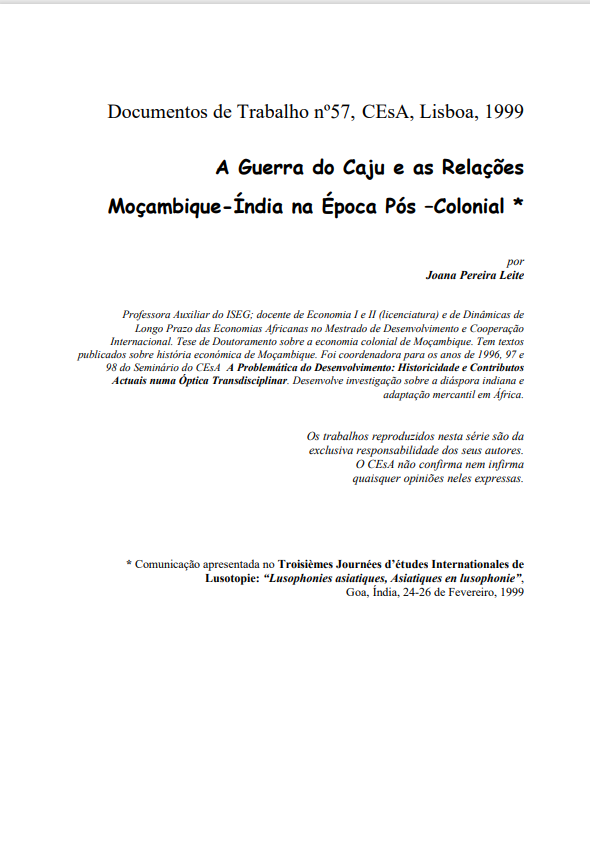
Working Paper 57/1999: A guerra do caju e as relações Moçambique – Índia na época pós-colonial
Abstract:
A guerra do caju e as relações Moçambique – Índia na época pós-colonial seeks to analyze the evolution of the cashew economy in the context of the profound changes that characterize the post-colonial period in Mozambique. We will appeal to the emergence of this sector of the export economy, during the first decades of the 20th century, associated with the start of the Indian peeling industry and we will also emphasize, within the Indo-Mozambican space, the structuring and dynamization of an autonomous commercial circuit vis-à-vis the to the Portuguese imperial logic. After the independence of Mozambique, the cashew economy will be observed in the context of the rupture operated in the political and economic system: from the model of administered economy, which characterized the socialist era, to the moment of transition to the market economy. In the context of liberalization and profound adjustments that characterized Mozambican society in the 1990s, the cashew war, a recurring event in the history of this sector, will once again be seen as a conflict between exporting interests, associated with the Indian shelling industry, and the industrializing dynamics that are defined internally.
Quotation:
Leite, Joana Pereira. 1999. “A guerra do caju e as relações Moçambique – Índia na época pós-colonial”. Instituto Superior de Economia e Gestão. CEsA (Centro de Estudos sobre África e Desenvolvimento) – Documentos de Trabalho nº 57/ 1999
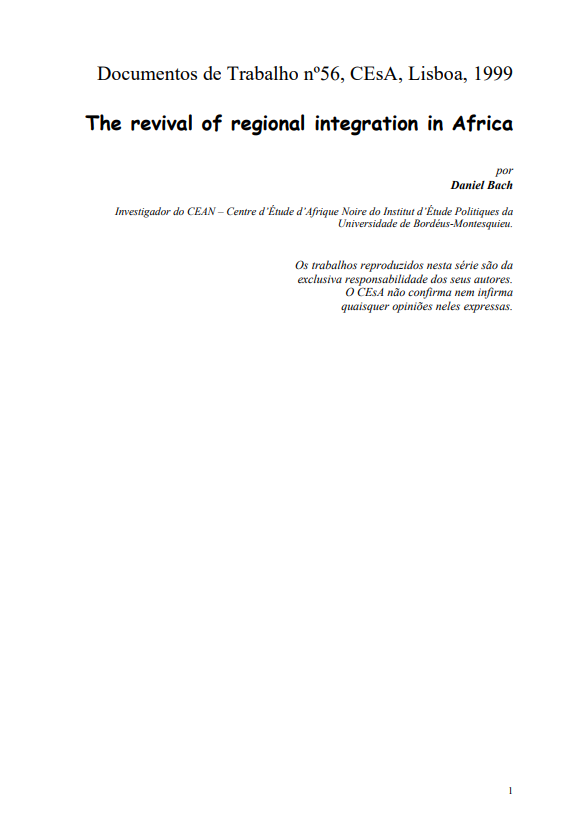
Working Paper 56/1999: The revival of regional integration in Africa
Abstract:
In The revival of regional integration in Africa we study how the need for [revival] regional integration has never seemed so pressing on the African continent, yet the numerous programmes and institutions have achieved very little since índependence. Regionalisation reveals itself in Sub-Saharan Africa through complex and often conflicting trends of interaction. Commitments to regional integration in Africa have been constrained by a highly ambivalent critique of the colonial heritage. At independence, the leaders of the new independent states readily acknowledged the disastrous effects of the partition of the continent, but were reluctant, if not totally unwilling, to support policies likely to restrain state sovereignty and, consecutively, their power. The break-up of colonial federations at independence suddenly highlighted the negative consequences of the extreme segmentation and the intrinsically problematic viability of the political divisions and economic circuits inherited from the colonial period. Whether violent or negotiated, the dissolution processes meant the disappearance of the fiscal and excise redistribution mechanisms which had been the raison d’étre of structures like the Afrique Occidentale Française (AOF), the Afrique Equatoriale Française (AEF), the Central African Federation or even, at a later stage, the East African Community. The continent had never been so deeply segmented when the OAU Charter then endorsed and legitimized in 1963 the territorial status quo.
Quotation:
Bach, Daniel. 1999. “The revival of regional integration in Africa”. Instituto Superior de Economia e Gestão. CEsA – Documentos de Trabalho nº 56/ 1999.
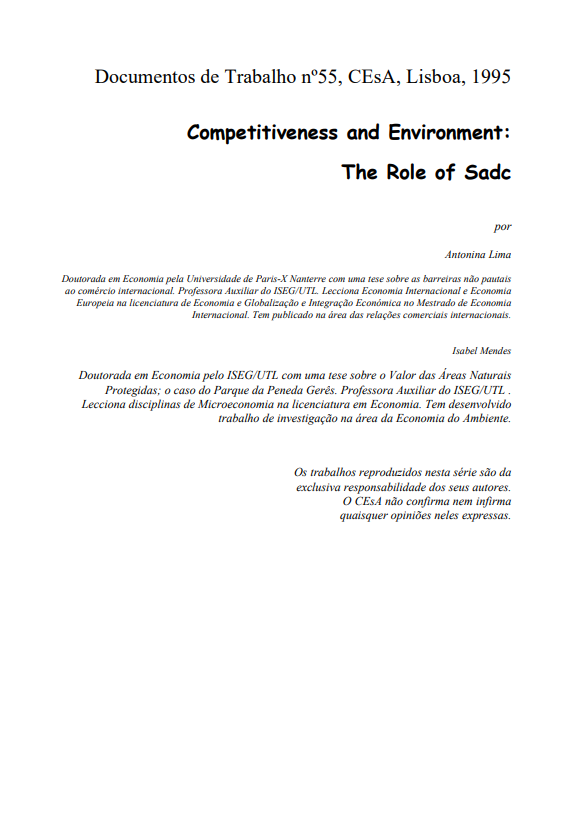
Working Paper 55/1995: Competitiveness and environment: the role of SADC
Abstract:
In Competitiveness and environment: the role of SADC we address the question of interaction between competitiveness and environment in the context of the ongoing globalization/regionalization process. In particular, this problem is analyzed in the context of the southern cone of Africa and at the level of the SADC (South African Development Community). Firstly, we try to debate some of the main links between competitiveness and environment in the new globalization context, attempting to place the question of the adaptability of this debate to SADC countries in particular, and to developing countries in general. Secondly, we analyze the main relevant characteristics of the SADC integration process. Finally, we make a review of the main programs and projects incorporated in the SADC Program of Action connected with environmental concerns, attempting to produce some insights on the relevance of the SADC in the context of the globalization process. In this article we want to discuss two main questions: to what extent can we say that gloalization entails a better environment or, on the contrary, the rise of environmental problems? If the latter will happen, do environmental regulations diminish the competitiveness of nations? And will the globalization entail higher pressures upon the developing country’s environment and the widening of present social-economic inequalities or, on the contrary, can globalization be seen as the opportunity developing countries were looking for to develop?
Quotation:
Lima, Maria Antonina and Isabel Mendes. 1995. “Competitiveness and environment: the role of Sadc”. Instituto Superior de Economia e Gestão. CEsA – Documentos de Trabalho nº 55/ 1995.
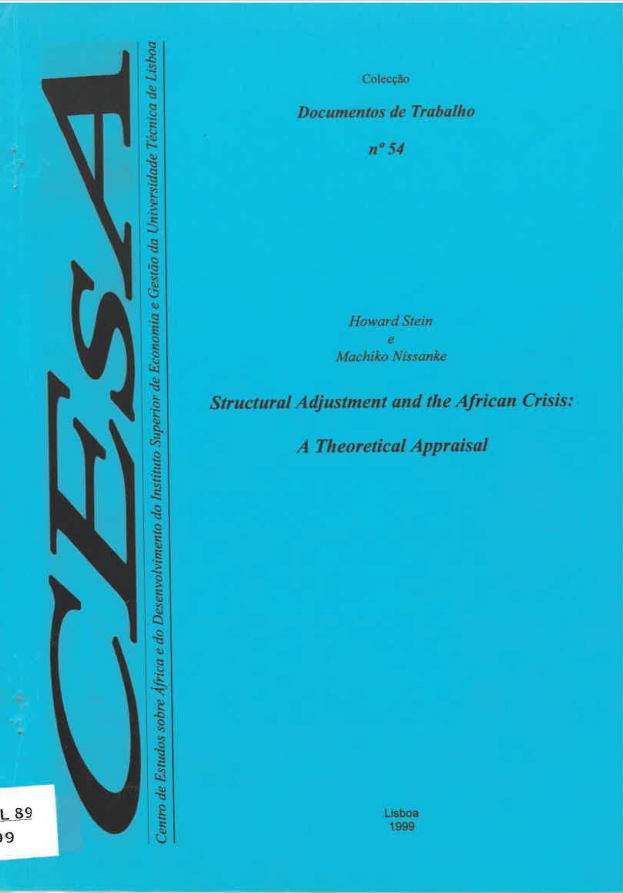
Working Paper 54/1999: Structural adjustment and the African crisis: a theoretical appraisal
Abstract:
Since the early 1980s, the economic policy and development debate in Sub-Saharan Africa has been singularly dominated by structural adjustment programmes (SAPs) which have been part of the conditionality tied to donor assistance. The debate concerning the appropriateness of SAPs for SSA countries continues to be unabated despite nearly two decades of ‘adjustments’. Towards this main objective, Structural adjustment and the African crisis : a theoretical appraisal is structured as follows. In Section ll, we shall examine the methodological and theoretical foundations of adjustment. This will be presented at three levels, i.e. an examination of: i) methodological sub-components of neo-classical economics; ii) intermediate propositions arising from the sub-components which are embedded in the theories; and iii) theories underlying adjustment as a reflection of these methodological foundations and intermediate propositions. In Section III we shall advance our case that SAPs based on this narrow foundation of neo-classical economics fail to embrace the complex issues involving structural transformation · in Africa. The section starts with a brief discussion of the inconsistencies in the theories underlying adjustment and the structural features of African economies, which are not adequately addressed by SAPs. We shall then show how SAPs are incapable of dealing with the exigencies of African development. Section IV first lists major developmental issues, which are central to effecting institutional and structural transformation in Africa. We shall then begin to outline a theory of dynamic, structural and institutional embeddedness as an alternative framework, which could explicitly treat development as a process of structural and institutional transformation. We shall conclude our discussion with a new policy and research agenda for African Development.
Quotation:
Stein, Howard e Machiko Nissanke .1999. “Structural adjustment and the African crisis : a theoretical appraisal” . Instituto Superior de Economia e Gestão. CEsA – Documentos de Trabalho nº 54/ 1999.
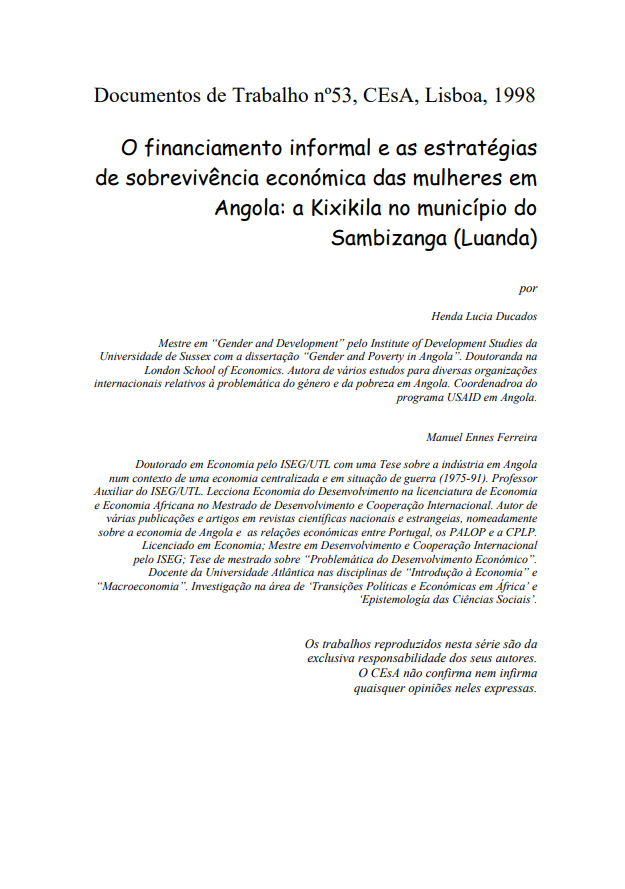
Working Paper 53/1998: O financiamento informal e as estratégias de sobrevivência económica das mulheres em Angola: a Kixikila no município do Sambizanga (Luanda)
Abstract:
In Africa there is a long tradition demonstrating the use of mutual aid schemes, particularly in terms of the rotating use of savings and credit (in the economic literature known as ROSCAs – Rotating Savings and Credit Associations) by individuals who develop micro economic activities, in most cases not fully integrated into the formal economy. After framing this issue in the economic literature, O financiamento informal e as estratégias de sobrevivência económica das mulheres em Angola: a Kixikila no município do Sambizanga (Luanda) will aim to show how those informal financing schemes – Kixikila in Angola – occur in Luanda and are an integral part of the survival strategies of Angolan women in the peri-urban area of that city, more specifically in the municipality from Sambizanga. The conclusions will be based on an empirical study carried out there between 1995 and 1997. The results achieved demonstrate the vitality and energy of the women involved in the ROSCAs (Kixikila), which should deserve the attention and support of development agencies, namely in the context of poverty alleviation programmes.
Quotation:
Ducados, Henda Lucia e Manuel Ennes Ferreira. 1998. “O financiamento informal e as estratégias de sobrevivência económica das mulheres em Angola: a Kixikila no município do Sambizanga (Luanda)”. Instituto Superior de Economia e Gestão. CEsA – Documentos de Trabalho nº 53/1998





